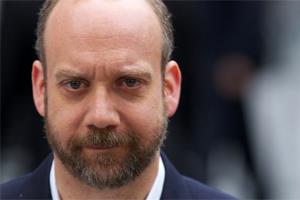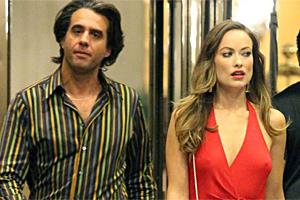I have seen the future, and it looks a lot like the TV-network equivalent of a murder-suicide pact.
It was Sunday night, the most heavily viewed night of the TV week, and there was too much for the DVR to keep up with.

There was The Good Wife, a good, occasionally great drama that is ending soon, and so qualifies as must-see TV. There was the addictive post-Edwardian period drama Downton Abbey, about to shutter its doors after a six-year run as one of PBS’s most-watched — and talked about — dramatic series. There was the latest blood-soaked outing of The Walking Dead, only the most-watched drama on cable right now. There was Vinyl, the two-hour pilot episode, directed by Martin Scorsese no less, of an eagerly anticipated, well-reviewed HBO period drama. There was a new episode of Billions, Showtime’s overheated takedown of the financial industry, starring Paul Giamatti (above) in his first full-on leading role in a dramatic series, this after playing former Federal Reserve chair Ben Bernanke in the 2011 HBO film Too Big to Fail. There were the usual Sunday suspects, old reliables like The Simpsons and Family Guy, bookended by the ever-dependable 60 Minutes on one end and the latest CSI-spinoff CSI: Cyber and cult favorite Castle on the other.
There was even a new season of Brain Games to factor into the mental equation.
I had the DVR going flat out, but of course it didn’t matter. Something had to give. I chose to watch Vinyl live, but was surprised by how squalid, violent — and annoying — that opening scene was, leaving me with the distinct impression that Scorsese keeps going over the same emotional ground he first mined in Mean Streets — in 1973, more than four decades ago. This was followed by an equally squalid, even longer scene in a back-alley ‘70s nightclub, yet another scene I’ve seen in countless other Scorsese dramas, and so I bailed.
I needed to know if Alicia Florrick was still falling out with Eli Gold or whether she had forgiven him by now; I needed to know if Alicia was still teetering on the edge of a nervous breakdown over not being able to let go of Will Gardner’s memory, or whether she’s focused again on her future; I needed to know if Jason Crouse was going to remain a part of Alicia’s life before the actor who plays him, Jeffrey Dean Morgan, takes on his new job, murdering people on The Walking Dead. (Yes, it’s true: Morgan has been cast as Walking Dead villain Negan from the comics and will make his first appearance in Dead’s sixth-season finale. Program your DVR!)

Yes, the trusty DVR means you can record up to three programs (or more, in some cases) and watch them later, and streaming sites now make it possible to watch TV programs at your own leisure. As it happened, I managed to catch the rest of Vinyl the following night, thanks to HBO’s habit of repeating its first-run programming throughout the week; once the story settled on German record group Polydor’s takeover of a New York-based indie label run by Bobby Cannavale’s character, it improved immeasurably, and I’m glad I gave it a second chance.
Despite a typically Scorsesean moment of excess at the very end — gangster, baseball bat, budding singing star who won’t cooperate; you can draw the line yourself, and you’d be bang-on — I’m hopeful for future episodes. Once Scorsese gets out of the way and the real behind-the-scenes TV talent, Boardwalk Empire and Sopranos svengali Terence Winter, takes over, Vinyl will be a much better series for it. It may even become appointment television, destination viewing for a crowded Sunday night.
Vinyl was the beneficiary of overheated reviews — though nowhere near as overheated as those for Billions, in which most reviewers failed to notice that fine actors are starring in a badly written, at-times surprisingly sloppy series. Despite the strong notices, Vinyl failed to draw a crowd. Fewer than a million viewers tuned in — 764,000 to be exact, give or take a Walking Dead admirer — which is fewer viewers than gave HBO efforts Luck, Treme and The Leftovers a chance their first nights out.
On the one hand, it doesn’t matter. HBO has already renewed Vinyl for a second season, because it can and because it knows that, somewhere behind Scorcese’s penchant for squalor, there’s a fine drama. For a pay-cable model that measures success in subscribers, not ratings, and is not beholden to commercial advertisers, picking Vinyl up for a second go round the TV turntable makes perfect sense.
Terence Winter, after all, is a proven winner. And, as anyone who watched Boardwalk Empire all the way through knows, Vinyl has a more-than-capable leading man in Cannavale, He has that unique ability to carry an entire series on his shoulders, should it come to that. (With Winter at the helm, it won’t.)
The real problem is the one facing the TV industry itself. The Walking Dead, (Michael Cudlitz, right) which is advertiser supported, stumbled slightly in its sixth-season return, with slightly under 14 million viewers tuning in to see the zombie invasion of Alexandria — down from both the final episode of 2015 and last season’s February premiere, according to tracking site TV By the Numbers.
The Good Wife, despite the accolades, Julianna Margulies’ Emmy wins and seven seasons worth of goodwill (or Goode Will if you prefer), is ending on its own terms, according to series creators Robert King and Michelle King. Even so, a third-season move to Sundays from Tuesdays didn’t help the numbers: The audience dropped to 11.8 million from 13.0 million virtually overnight. As if stiff competition from other networks wasn’t enough,
Sunday has always proven a tough nut for CBS shows to crack, thanks to yet another player in the Sunday game: constant time overruns from NFL games played earlier in the day. It’s one thing to say The Good Wife is scheduled to start at 9 p.m; it’s quite another when Good Wife viewers learn on the same day that the episode will begin at 9:17 p.m. or 9:42 p.m., or some equally awkward, impossible-to-set-aside time. Not all DVRs are created equally, either: Some will record a program as it airs, but others stick to the pre-assigned time. (That’s easily solved by programming the entire night to record a single channel, but not everyone is likely to think of that. And, besides, with everything else on that night, it’s only a matter of time before the DVR may shut down entirely. Or explode.)
The new TV environment allows die-hard fans to catch up later, of course, either through same-week reruns — HBO and Showtime, for example — or by streaming the episodes from network websites and other sources, in the days and weeks after the episode has aired live.
TV’s business model is based on live, same-day viewing, though. Commercial advertisers face their own challenges from rapidly evolving technology and changes in consumer habits. Same-day viewing is now more critical to advertisers’ bottom line than at any time in recent memory. Despite some wacky research that suggests otherwise, no one in their right mind is going to watch TV commercials two or three days after the fact, not when the DVR comes with a fast-forward function that allows one to skip through the ads — up to seven minutes, in some cases — and be able to watch an hour-long program in 45 minutes or less.

Last summer, FX president and general manager John Landgraf, one of TV’s most outspoken — and thoughtful — executives, caused a stir when he suggested there is too much good TV on TV right now. (Michelle Dockery, Laura Carmichael, Downton Abbey, right.) The resulting hue-and-cry was enough to send a lesser man into a witness protection program, but Landgraf stood by his comments.
“This bubble has created a huge challenge for programmers to find compelling original stories, not to mention the level of talent needed to create those stories,” he told the semi-annual gathering of the Television Critics Association, that day in Los Angeles. “It’s had an enormous impact of everyone’s ability to cut through the clutter and create real buzz.
“There’s just too much competition, so much so that I think the good shows often get in the way of the audience finding the great ones.”
Landgraf was referring to the TV industry in general, but he could just as easily have been referring to Sundays, and Sundays alone. Myriad viewing options may be a boon to viewers, but executives are increasingly anxious about advertisers whose primary concern is those viewers who watch within the first three days of broadcast. And everyone knows that audience is shrinking.
While virtually all the other networks, cable and broadcast alike, roll out much of their strongest programming on Sundays, FX chooses to air movies that night, and saves most of its marquee programming — Emmy and ratings contenders like Fargo, American Crime Story, The Americans, American Horror Story and Louie — for midweek nights.
It’s easy to see why many network executives choose Sundays to showcase their marquee programming. More viewers stay home and watch TV on a Sunday than any other night because it’s the beginning of the work week and the kids have to be packed off to school first thing the following morning. There’s no upside, though, in scheduling Fargo on a Sunday night, knowing that it’s going to be up against Downton Abbey, The Walking Dead, NFL overruns, The Good Wife, and now Billions and Vinyl, too.
It won’t get any easier in the spring either. Game of Thrones is back in April. The 24th, to be exact.
Landgraf was roundly ridiculed and abused for his remark that there’s too much good TV.. He had a point, though, especially where Sundays are concerned. When so much of what you see on TV is advertiser supported — and FX is supported by commercial ads — anything that eats into that commercial revenue has worrying implications for TV’s financial future.
The TV industry is cannibalizing itself on Sundays, with all those viewing options. And not only because of The Walking Dead. It’s like some giant, out-of-control murder-suicide pact. And it can only end one way.